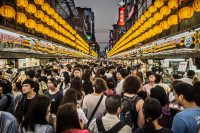
Genom att läsa av internetkommunikationen och släppa igenom valda delar upprätthåller kommunistpartiet sin makt, skriver Mark Leonard.
It was a blood bath. A methanol tanker crashed into a bus, killing 36 people and injuring more near the Chinese city of Xian on Aug. 26. Soon after the accident, a photograph appeared online of Yang Dacai, the local official in charge of road safety, smirking at the scene of the crash. The photo prompted a flood of Internet anger. The comments of netizens soon moved from the official’s demeanor to the value of the watch on his wrist. Bloggers managed to unearth pictures of Dacai wearing 11 different luxury watches, together worth many times his official salary. Last Friday, the Chinese media reported that Dacai had been sacked after an investigation into corruption.
Yang Dacai is just the latest focus of an electronic herd whose activism and anger appear in sharp contrast to the staid and controlled official politics in China. The regularity with which these scandals erupt helps explain why an opinion poll in China 18 months ago revealed that 70 percent of senior Chinese officials live in a state of “Internet terror.”
Over the last few years, officials at all levels of government in China have fallen prey to electronic vigilantes who have exposed corruption by looking at the value of officials’ possessions or the misdemeanors of their relatives. This is what makes the effect of the Internet on Chinese politics so paradoxical: It could seriously lengthen the life of China’s one-party state. In much the same way that the market has saved the country’s Communist Party, China’s state-controlled Internet could save its leadership.
Deng Xiaoping, one of the reformers of the Communist Party in China, feared the destructive power of unfettered markets. He envisioned “socialism with Chinese characteristics” as an incremental attempt to harness the power of the market while maintaining control of the commanding heights of the economy. Although officials live in terror of the Internet, the party has developed a sophisticated approach that gives citizens a chance to air their views even as it retains control of the servers.
The Internet reaches 538 million people in China, and approximately half of them are on Sina Weibo, which is often called China’s Twitter. Sina Weibo seems to operate as a public sphere where netizens exchange news and views on a range of issues far too sensitive to be covered by the China mainstream media (as the case of Yang Dacai makes clear). Although it is possible to air grievances against party officials and policies on the network, China’s Internet is only a semi-free environment.
A Chinese Internet executive – speaking on condition of anonymity – explained that the idea of the “Great Firewall of China” has given Westerners a misleading idea of how Chinese censorship works. It is true that the government blocks access to certain websites and the use of some keywords, but these are relatively easy hurdles for most users to get around. China’s government is not worried about information from the outside coming into China. Its big fear is of Chinese citizens organizing collective action against the government. As a result, most of the censorship is no longer a massive ministry of truth with a single list of banned words. It is, rather, “insourced” to companies and individuals to maintain a balance in public discourse.
Chinese blogger Michael Anti describes the state’s approach to the Internet as this simple premise: “block and clone.” China’s government blocks Western companies like Google, Twitter and Facebook, but it allows the development of Chinese variants of these platforms – with the condition that they keep all their servers in Beijing. There, the government can access and control all data and messages flowing through these iterations of social media, while offering a more complex communication channel for members of society to vocalize opinions. The government has the ability to block data with surgical precision and take action against those it chooses.
A study by a group of researchers at Harvard led by Professor Gary King casts a light into the murky world of Chinese censorship:
Unlike in the U.S., where social media is centralized through a few providers, in China it is fractured across hundreds of local sites, with each individual site employing up to 1,000 censors. Additionally, approximately 20,000–50,000 Internet police and an estimated 250,000–300,000 ‘50 cent party members’ (wumao dang) are employed by the central government.
The researchers estimated that approximately 13 percent of all social posts are removed by censors in China. They explain that the goal of censorship is not so much to prevent criticism as to prevent collective action:
They seem to recognize [that] looking bad does not threaten their hold on power so long as they manage to eliminate discussions with collective action potential.
The Internet has rapidly become an integral part of the governing strategy of the Communist Party. Every official begins every day with a stack of comments showing the main themes and discussions from the Internet. The party’s selective opening and blocking of information has been used to powerful effect; but the effects are often most harmful to local government officials who need to be reined in. Because the servers belong to the central government in Beijing, local and provincial governments are powerless to control flows of information. According to Anti, this allows the central government to use the absence of censorship as a political tool.
As the Harvard researchers show, social media has become “an effective governmental tool in learning how to satisfy, and ultimately mollify, the masses … a theoretically optimal strategy for a regime to use social media to maintain a hold on power.”
After a tragic train crash in Wenzhou in 2011, the government allowed 10 million critical messages about the Chinese railway minister – who was the object of the ire of even top officials at that point – to be aired on social media over five days.
Later there was an even more dramatic and relatively free Internet debate about Chongqing party head Bo Xilai from February to April of this year. There is speculation that lurid rumors about Bo and his wife, Gu Kailai, were deliberately encouraged by the party to sap the legitimacy of a very popular leader to the point where he could be purged.
Although the technology of the Internet is very new in China, the political dynamics it is unleashing are very old. The electronic crowds being mobilized are playing the same role as the Red Guards in China’s Cultural Revolution.
One reason that planned economies fail is that they are unable to access information that may help avoid being outperformed by free markets. There is a parallel explanation for why democracies often outlive autocracies. Many regimes collapse when they miscalculate public opposition to particular policies or because their citizens stop bringing grievances to a state they no longer regard as legitimate. Allowing criticism may legitimize the state and help the regime maintain power.
Today’s rulers in China recognize that they are playing with a river of fire that can be channeled but never fully controlled. It is not impossible that China’s technology-driven cultural revolution could strengthen the political hold of the Communist Party on Chinese society in the same way that Xiaoping’s market revolution strengthened its hold on China’s economy. The Internet could lend greater legitimacy and resilience to the one-party state. However, China’s officials will never stop fearing a technology that could sweep them away.
Mark Leonard is a British journalist and author.
Fotnot: Texten är tidigare publicerad på Mark Leonards blogg på Reuters.com och publiceras med tillstånd av författaren (the text has previously been published on Mark Leonard’s blog at Reuters.com and is re-published by kind permission by the author).
Följ Dagens Arena på Facebook och Twitter, och prenumerera på vårt nyhetsbrev för att ta del av granskande journalistik, nyheter, opinion och fördjupning.

































